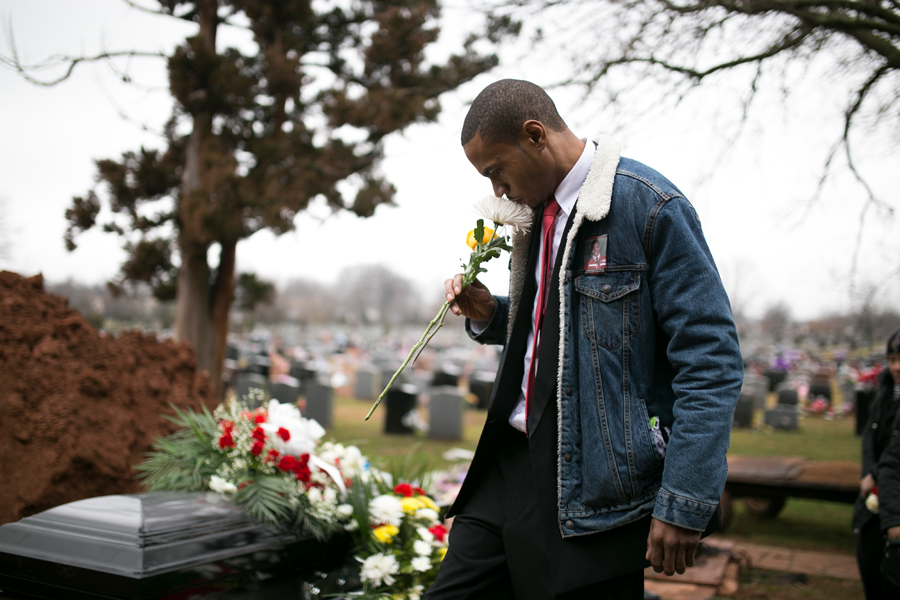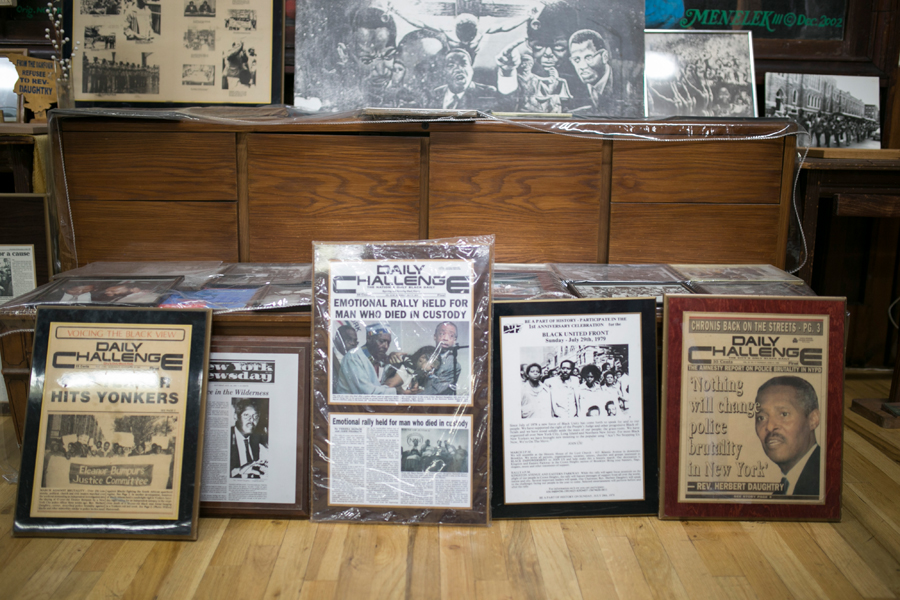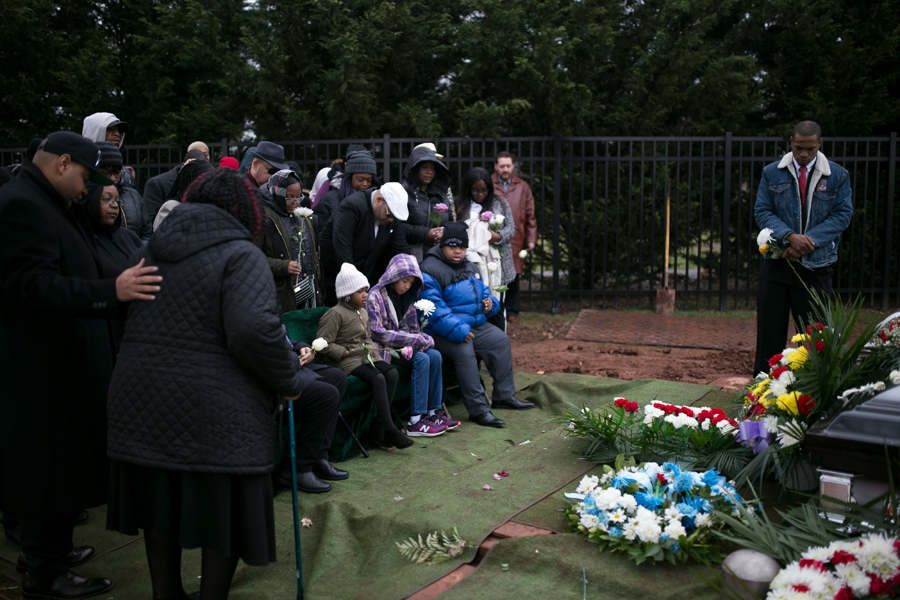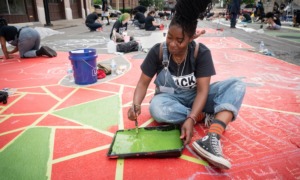
Photos by Clarissa Sosin
Quentin Heyward sniffs a flower before placing it on his father’s grave. He was 6 when his older brother was fatally shot while playing.
NEW YORK — On Sept. 27, 1994, Nicholas Heyward Sr.’s life changed. His 13-year-old son, Nicholas Naquan Heyward Jr., was playing cops-and-robbers with a toy gun in the Gowanus Houses in Brooklyn when he was shot and killed by Brian George, a New York Police Department housing authority officer. Heyward Sr. would spend the rest of his life battling the city — the NYPD, City Hall and the Brooklyn District Attorney’s office — for transparency and accountability in his son’s killing.
He became a modern-day Mamie Till, using his son’s death to draw attention to the civil rights crisis of police brutality and the lack of accountability in the criminal justice system. His work was credited as laying the foundation for the Black Lives Matter movement, which erupted into public eye in the wake of more recent and higher-profile police killings.
On Dec. 31, 2018, after 24 years of fighting for justice for his son and others killed by the police, Heyward Sr. passed away at the age of 61. A week later, his family held a wake. A few hundred mourners gathered to share stories of his life and his work. At one point the line of people crowded the foyer of the funeral home and spilled out onto the sidewalks.
He was buried the next day. Remembered as a devoted and dedicated father, and also as a father figure to a small but committed band of activists, the bereft crowd at both events was made up of Heyward’s two families — one connected by blood and the other by his Sisyphean pursuit for justice.
The Wake
Interboro Funeral Service, 544 Evergreen Ave., Monday, 5 to 8 p.m
In the days after hearing about Heyward Sr.’s death, Kathie Cheng realized that Heyward Sr. had never been honored for the work he put into the Stolen Lives Project. It was hard for her to believe since he had sat on the board for the project, and the two had worked side by side as organizers with the October 22 Coalition to Stop Police Brutality.
Part of the Stolen Lives Project is dedicated to recording the names of the victims of police violence from 1990 to the present and recognizing their families. Every year organizers hold a ceremony where they present families of victims with certificates. The last ceremony was at a Harlem church in October, when Cheng inducted Akai Gurley, a 28-year-old who was also shot and killed by a police officer in a Brooklyn public housing stairwell.
She had intended to present Heyward Sr. with a certificate of appreciation for all the work he had done during that ceremony. He was supposed to attend but his health problems had already begun to hobble him and he couldn’t come.
So when she came to his wake Monday evening, she brought his certificate. Since she couldn’t deliver it to Heyward Sr. himself, she resolved to give it to his oldest surviving son, Quentin.
After a crying cousin finished reminiscing about growing up with Heyward Sr., Cheng and a mother of someone else killed by the police went to the podium next to his casket, surrounded by colorful bouquets with dedications etched on ribbons. One read, “beloved husband,” the other remembered him as a “fighter for justice.”
A picture slideshow of Heyward Sr. flashed above her on a video screen mounted to the wall. The images vacillated between the two families that came to define his life since his son was killed — one on the homefront, the other from the frontlines of the movement. At one moment he’s dancing at his wedding with a fun-loving grin on his face; the next he’s screaming into a bullhorn at a protest, his face frozen with his veins bulging out of his neck.
Cheng’s voice quavered as she called Quentin up to the podium. She pulled out a piece of paper and read from it.
“The certificate of appreciation for Nicholas Heyward Sr., for your upstanding commitment and service to the families of the Stolen Lives Project,” she read, fighting tears. “Even though you’ve suffered greatly for the loss of your son, you’ve continued to serve as a beacon of light to the other parents.”
The room erupted with applause as Quentin took the certificate and hugged Cheng.
The Funeral
House of the Lord Pentecostal Church, 415 Atlantic Ave. Tuesday, 9 a.m. to noon
This wasn’t Quentin Heyward’s first time sitting in this church. In 1994 the same pastor, the Rev. Herbert Daughtry, stood in the same pulpit at the House of the Lord Pentecostal Church to lead the funeral service for his older brother Nicholas Heyward Jr.
Tuesday morning, 24 years later, he sat in the same pews again. This time it was for his father. Just after 10 a.m., a representative from the funeral home made an announcement. Anyone who wanted to pay their final goodbyes to Heyward Sr. had to do so in the next five minutes. After that, he said, they were going to seal the casket for good, and it would not be reopened.
Quentin stood up and made his way to his father’s side. He stood over him, alternately stroking Heyward Sr.’s face and adjusting his suit jacket and pocket handkerchief as tears streamed from his face. Others gathered around Quentin, rubbing his back and whispering words of support. He then returned to his seat in the front pew, where he stared at the ground for the first half of the service.

Framed front pages of the Daily Challenge, a black newspaper, featuring stories about police brutality in the basement of the House of the Lord Pentecostal Church in Brooklyn, where Nicholas Heyward Sr.’s funeral service was held.
When it was his turn to take the pulpit, Quentin gathered himself and approached the microphone. He thanked the pastor for providing services for both a father and a son. Then he talked about a quote from Sitting Bull that his father had taped to his wall, next to a picture of Africa and a painting of civil rights leaders. He wondered how many times his father read the quote at night before going to bed or upon waking.
“‘Warriors are not what you think of as warriors,’” he said, reading the quote. “‘The warrior is not the one who fights because no one has the right to take another life. The warrior for us is the one who sacrifices himself for the good of others. His task is to take care of the elderly, the defenseless, those who cannot provide for themselves —,’” and then his voice wavered before he continued, “‘and above all the children — the future of humanity.’”
He explained that tragedy alone didn’t motivate his father to throw himself into the movement.
“My father, my father was not driven by pain, he was not driven by grief, these things come naturally when you lose a child. He was driven by justice,” Quentin said, sharply emphasizing the last word.
A murmur of assent rippled through the church. People shouted in response: “That’s right!”
Before Quentin returned to his pew, he recounted a story to his fellow mourners. He remembered that his father called him once with a guilty conscience. His activism had kept him away from home for long stretches of time. He had called Quentin to apologize for his absence. Quentin wouldn’t hear it, he said. He thought his father was “handling his business.”
“I told him, ‘If it was me he would do the same,’” he said. “That was his journey, his path, his calling. And no apology was necessary.”
The Burial
Rosehill Cemetery, Linden, N.J., Section 48, Tuesday, 2 to 3 p.m.
The funeral procession parked along the narrow cemetery road. Blinkers flashed in the rainy afternoon gloom. After a short wait, the mourners clambered out of their cars and made their way to the makeshift walkway. Sections of plywood had been slapped onto the muck so that people could navigate their way through the muddy slop. The boards squelched and wobbled as they walked to Heyward Sr.’s final resting place, a grave in section 48 at the eastern edge of the Rosehill Cemetery.
The casket sat on an improvised platform of soggy green mats and slabs of wood caked with mud. Freshly dug earth towered next to the site, where the casket lay adorned with flowers. A pile of bouquets lay next to it. A red ribbon attached to one wreath of carnations and roses whipped around in the bitter wind. Heyward Sr.’s plot was the first in a fresh row marked by a series of concrete slabs with letters childishly scrawled on them.

Family and friends of Nicholas Heyward Sr. pray before saying their final goodbyes at the Rosehill Cemetery in New Jersey.
A woman from the funeral home said a prayer about peace and people replied with a chorus of “Amen.” Then a cemetery employee pushed a button. The contraption that held the coffin whirred to life and the vinyl straps lowered Heyward Sr. into the hole. In turn, the mourners approached the casket and dropped a flower on top. Some mumbled a few final words, others did so silently.
But Juanita Young stayed away. She couldn’t bring herself to go to the grave’s edge.
“I couldn’t do it,” she said. “He was like my little brother. He was my best friend. I’m not ready to say goodbye. It hurt too much. I couldn’t stare into that hole.”
When Young’s son Malcolm Ferguson was shot and killed by police in 2000, the first person to reach out to her was Heyward Sr. He often was the first point of contact for parents dealing with the shock of losing a child to police violence. Young said she was prepared to surrender to the grief. But Heyward Sr. wouldn’t let her. As in his case, Ferguson’s fatal shooting was ruled an accident and the the officer who killed him was never charged. Heyward Sr. told her to go out and be vocal about what happened to her son or else all the world would ever hear was a sanitized version.
He encouraged her to never give up in fighting for justice for her son. The two frequently led marches throughout the city drawing attention to what they saw as the urgent need for criminal justice reform.
“We’re not going to stop just because he’s gone,” Young said. “His death will not be in vain.”






























